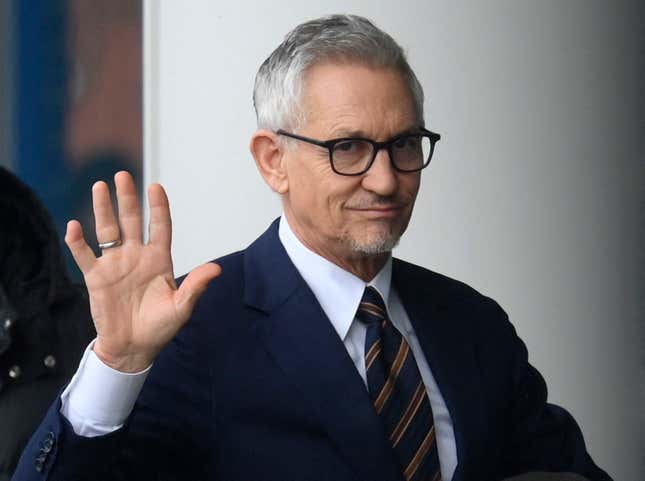
The British Broadcasting Corporation (BBC) has had a tough week.
Today (March 13), the BBC announced that one of its most popular and highest-paid presenters, Gary Lineker, a sports commentator and former football player, would be returning to screens after he was suspended for breaching BBC impartiality rules. Lineker had, last week, tweeted criticism of the UK’s harsh policy on refugees—which was, the BBC thought, a breach of its rules that its presenters must be “impartial” about the news.
The row over Lineker’s tweets highlights the trickiness of the “balancing act” that the BBC tries to pull off: promoting free speech on the one hand, and remaining impartial on the other.
The UK’s hardline immigration policies, announced on March 7, seek to keep every person using illegal means to enter the UK—including legitimate asylum seekers—off British soil permanently. They may be deported for their cases to be heard remotely, and perhaps ultimately offered asylum in a “third country,” namely Rwanda.
But beyond the policies themselves—only aspects of which were brand new—the rhetoric used by Suella Braverman, the home secretary, to talk about refugees and other migrants stoked anger. Braverman said several times that she would “stop the boats,” referring to small craft used to cross the Channel between France and the UK. Dozens of people have died attempting the voyage; last year, around 45,000 people crossed over. Braverman claimed that the UK is being “overwhelmed” with people trying to gain access to it.
Why was Gary Lineker suspended?
After Braverman released a video outlining her policy, Lineker, now most well-known for presenting the BBC football program Match of the Day, was drawn into a Twitter debate about it. Responding to another user, he said: “There is no huge influx... This is just an immeasurably cruel policy directed at the most vulnerable people in language that is not dissimilar to that used by Germany in the 30s...”
The BBC’s response, and the backlash
Lineker’s views caused a problem for the BBC. As a public service broadcaster, the BBC has a constitution—called a Royal Charter—designed to keep it non-partisan when reporting on the government and its opposition. On March 10, the BBC said that Lineker would not appear on television until it had reached a clear agreement with him about his social media use.
But the decision spiralled into a fiasco. At least nine other presenters pulled out of Match of the Day in solidarity with Lineker; on Saturday, March 11, the programme aired with no presenters, no commentary, and without even using its theme tune.
The high-profile scramble to get something, anything, on air in the absence of support from highly visible staff was an embarrassment for the BBC. The network was seen as muzzling a viewpoint on migration policy that Lineker expressed in his personal, not professional, capacity, and with which many agreed.
Today, the BBC announced Lineker’s return to the program when it next airs, as well as an official review into its social media policy, which, it admitted, had “grey areas” that caused “potential confusion.”
The furore has been an indication of the BBC’s difficulty in maintaining its version of impartiality. The edict to be impartial was drawn up in an era when broadcasting was one of the only ways to spread a public message, but it has been carried forward into a time when social media provides so many channels for communication.
The BBC routinely comes in for criticism from people at both ends of the political spectrum. Recently, though, it has faced accusations that successive Conservative governments have had too much sway over its policies. The government sets the public license fee that supports BBC programming—an arrangement that grants a lot of power over the broadcaster’s future.